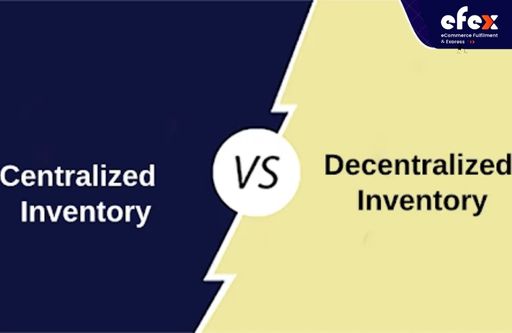
More Helpful Content
When it comes to the profitability of retail, inventory management is indeed a major boost. Once your inventory is well handled, other areas of your company benefit. Nevertheless, business owners don't always recognize or pay attention to the value of inventory management. Without a question, inventory is what makes a business successful.
You don't want to drop a sale because you don't have enough inventory to meet an order. Being out of stock throughout the peak season might ruin your business, resulting in bad customer feedback and a quarter's worth of financial losses.
Luckily, you can take full control of your inventory and develop more effective sales strategies with the help of a centralized inventory management system. Here's everything you need to know about centralized inventory.
Centralized inventory is a strategy of inventory storage that helps you keep all of your stock in a single location. A retail shop, a warehouse, and other sorts of storage facilities could serve as this central location.

The logistics functions, such as processing as well as fulfilling orders, are often housed at the central site where all inventory is kept, rather than at several distribution centers. Even if you offer from many stores or different retail locations, all or the majority of functions in a centralized system are administered from a single place.
👉 Read More: What Is In-Transit Inventory? Example And Formula
👉 Read More: What Is Inventory Allocation? Methods And Benefits
An efficient inventory management system is not a treat; it is a must if you want to expand your business online and stay alive. A successful inventory management plan can alter your operations and put your company in a competitive position. Here are several advantages of using an effective centralized inventory management system in your company.
Operational efficiency is one of the main advantages people who switch to a centralized inventory seek. A distribution center's centralized inventory can greatly improve operational effectiveness. Pick-pack-ship centers are quite effective in distribution centers.

However, it also possesses the ability to improve productivity in a physical setting. One benefit of having one location for your merchandise is that you, your staff, and everyone else can see the same thing. The data from the inventory is consistent across all points of view. Everyone in your company can make judgments based on identical data if this is the case.
Communications are also more effective as each individual is viewing the same facts. Someone has previously had the opportunity to do it independently, so you don't need to devote as much effort to introducing the material or getting them up to speed.
When you have consolidated inventory for your company, you have a team of individuals who are responsible for receiving, completing replenishment orders, and efficiently shipping orders.
As a result, your internal team won't have to put marketing, on-site sales, or customer care on hold to handle incoming or outgoing product issues.
👉 Read More: What Is Perishable Inventory? Example And Model
Consumers of today shop in a number of methods, both online and offline. In reality, just 7% of consumers make all of their purchases online, while 73% make use of multiple sales channels. The fact that almost three-quarters of stores prioritize attempts to promote their products through multiple channels is probably the reason for this.
As you attempt to keep everything in sync when you go to a multichannel retail company, there are numerous lot more things, processes, and people to think about. If you handle all orders from one place, it can assist streamline operations and lower the possibility of completing an order twice or offering goods in-store that has previously been bought online.
When a retailer decides against using a ship-from-store approach, inventory centralization is effective. In order to support omnichannel shopping, ship-from-store makes use of in-store stocks to complete in-store and online purchases.
👉 Read More: What Is Available To Promise Inventory? Example and Calculation
Another strategy to cut costs in your retail business is to centralize your inventory. You can utilize fewer resources and spend less time on particular business tasks like order fulfillment or collecting inventory reports since your data is much more reliable and your processes are more effective.

Furthermore, precise data allows for better-informed company decisions, which can help avoid expensive blunders. The annual loss to retailers from overstocks, out-of-stocks, and returns is $1.75 trillion. Research indicates that with better inventory management, you may also enhance earnings by 50%, making the potential to raise sales difficult to pass up. While shrinkage cost retailers $100 billion in lost revenue in 2017 on a global scale.
Offering what the customers desire when they demand it is the main goal of inventory. By centralizing every of your inventory, you will avoid problems such as overselling. Delivering the greatest possible customer experience alongside surpassing expectations will be made possible by managing your inventory from a single spot.
Increased client satisfaction, as well as inventory control, results in better revenue for your company. Because each of your channels is integrated when you use a unified system, identifying the best-performing product is simple. An in-depth understanding of your store will help you develop superior sales methods.
Although centralized inventory has many advantages, it all comes down to the kind of business you manage. Each retailer is not a good fit for centralized inventory.
In addition to the centralized inventory strategy, retailers have access to a number of different solutions that can assist them to handle different sales channels, boosting efficiency, and saving money in the process.

Retailers, for example, can apply ship-from-store to utilize the field inventory for fulfilling orders if they are using good order management software (or OMS). With the OMS, you will get the complete picture of the inventory on hand rather than centralizing. No matter where they are, effective systems will provide retailers with a worldwide inventory view.
If there is a demand spike in a particular location or the weather causes fulfillment from your single warehouse impractical, it can be challenging to fulfill orders with stock in a single place. However, physical businesses with locations in a particular area might not have such kinds of difficulties during regular business operations.
If a store wants to start spending a lot of money on their eCommerce presence without growing their brick-and-mortar business nationwide, it is the most apparent time to consider centralized inventory. Here, logistics are crucial. Centralized inventory is generally not a good idea for your business if you have physical sites all over the world.
Your in-store experience should not suffer as a result of moving your logistics center too distant from a few of your outlets. Ultimately, whether centralizing your inventory will be the best option for you depends entirely on your particular business demands.
Centralized inventory vs decentralized inventory are two different approaches that a firm can utilize to distribute and keep products.

The centralized inventory strategy, as previously indicated, entails a company holding all of its inventory in a single facility or location and handling logistical operations like order fulfillment from such a center. This is the most common method of inventory management since it streamlines your supply chain by maintaining the most important tasks under one house.
Decentralized inventory, in contrast, entails storing a percentage of the total inventory at each of several warehouses scattered across several geographic regions. Each of the above locations processes, picks, packs, and sends orders coming to a specific area or location near to them. They also handle warehousing and fulfillment tasks. Instead of using a single centralized warehouse, businesses could use retail outlets or storefronts as small fulfillment centers and use direct store delivery.
- Read More: Order Management System: Definition, Process And Value
Both of these strategies have advantages and disadvantages; neither is always better than another.
In the end, you'll need to compare the advantages and disadvantages of centralized inventory vs decentralized inventory to choose which strategy is ideal for your company. Here is a summary of the advantages and disadvantages of centralized vs decentralized inventory to assist you in weighing your choices.
Pros:
Cons:
Pros:
Cons:
- Read More: Order Management System For Ecommerce: Definition, Key Effect, Benefit
How do you manage the inventory for your retail company? Would you find it useful to have a centralized inventory? We hope you will find the right answer after reading this post. Thank you! Hope you have a good time with Efex


